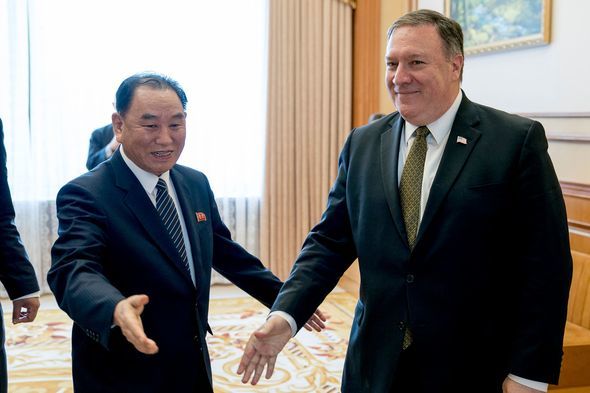Posted on : Jul.9,2018 16:59 KST
Modified on : Jul.9,2018 17:18 KST
 |
|
Kim Yong-chol, Vice Chairman of the Central Committee of the Workers‘ Party of Korea (WPK), and US Secretary of State Mike Pompeo
|
The high-level talks between North Korea and the US that were held in Pyongyang between July 6 and 7 concluded without any definite progress being made. While US Secretary of State Mike Pompeo had been expected to meet with North Korean leader Kim Jong-un, their meeting never occurred, making clear that the results of the talks were dissatisfactory. Since this was the first high-level meeting held since the June 12 summit in Singapore, hopes ran high and have now been dashed. We hope that the two sides will both give ground to each other in future negotiations to achieve meaningful results.
There is a gap between North Korea and the US’s assessment of the talks’ results. Pompeo said that progress was made in nearly all the key issues, while North Korea’s Foreign Ministry released a statement expressing its concern that the US only brought unilateral demands for denuclearization. The pushback from North Korea appears to have been triggered by the US offering a timeframe for denuclearization and asking for the beginning of the nuclear reporting and verification process without providing a timeline for guaranteeing regime security or relaxing sanctions. In the future, the US will need to work a little harder to devise compensation for the North’s denuclearization.
What is particularly troubling is that the Foreign Ministry’s statement criticized the US for “attempting to put off the issue of declaring the end of the Korean War by imposing conditions and making excuses.” North Korea had hoped that these talks would lead to an agreement to formally end the war on July 27, which marks the 65th anniversary of the armistice agreement.
Formally ending the war can be seen as a starting point for guaranteeing the North’s security and for building trust between North Korea and the US, and this is also an issue on which Trump has shown his commitment. It would not be difficult to reach a conclusion on this matter if the US were only resolved to do so, and it is truly disappointing that no conclusion was reached.
It is also troubling that Americans who are skeptical of negotiations are drawing attention to the fact that North Korea and the US failed to reach any major results on the issue of denuclearization. The press and politicians are claiming that “the fate of the negotiations has been thrown into doubt” and that “North Korea has thrown cold water on the negotiations.” Instead of being swayed by such skepticism, the Trump administration needs to prepare even more thoroughly so that the negotiations can be successful.
During the talks, North Korea and the US did agree to set up a working-level group to discuss key matters, including verification of denuclearization. That is significant since it means that a framework has been created to preserve the momentum of the negotiations. The agreement to hold talks in Panmunjeom on July 12 for the repatriation of the remains of American POW/MIA and the agreement to soon hold working-level talks to discuss shutting down the North’s missile engine test site will also contribute to progress in future talks.
The important thing is that this confirms that neither North Korea nor the US want the talks to break down. The exchange of personal letters between Trump and Kim also shows that both sides seek progress in the negotiations. The first round of North Korea-US negotiations culminated in the Singapore summit on June 12, and the second round has now begun. It is reasonable to think that, just as the first round had plenty of twists and turns, the second round will face its challenges as well. North Korea and the US need to find common ground while making concessions where possible. The South Korean government should also continue in its efforts to mediate between the two sides.
Please direct comments or questions to [english@hani.co.kr]






